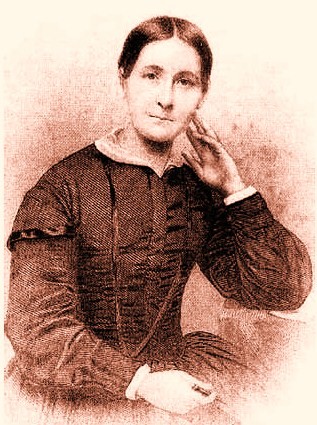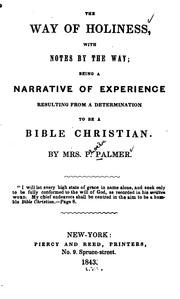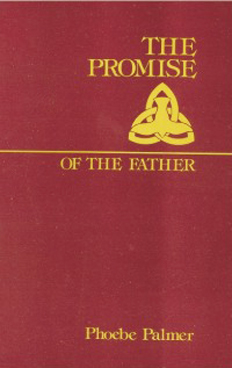O my soul, mayest thou ever remain upon the altar of sacrifice; and Thou, my strength and righteousness, forbid that any unhallowed act should ever cause its removal! It is by Thy power alone, O God that I am kept. Here shall I ever feel the cleansing efficacy. Here shall my soul fill and expand – fill and expand – till it shall burst its tenement, and faith shall be lost in sight. (Phoebe Palmer, The Way of Holiness)
 Phoebe Palmer, the Mother of the Holiness Movement, was a devout Christian wife, mother, evangelist, and writer. Last week we looked at the details of her life including her conversion, calling, and work both as an evangelist and a devoted worker for the poor and downtrodden.
Phoebe Palmer, the Mother of the Holiness Movement, was a devout Christian wife, mother, evangelist, and writer. Last week we looked at the details of her life including her conversion, calling, and work both as an evangelist and a devoted worker for the poor and downtrodden.
Phoebe was a prolific and popular writer. It is hard in our day with our word processors to imagine how many hours Phoebe spent writing letters by hand. She always took time to write back to people even if she didn’t know them when they wrote to her asking for her advice on personal problems. She responded to many inquiries about her doctrine of Holiness (Entire Sanctification) that was different from the traditional view of sanctification for Methodists who followed Wesley.
Phoebe promoted her own views on sanctification in her writing. In her early life as a Methodist, Phoebe followed the Wesleyan view of sanctification. Wesley’s emphasis was on the disciplined life that would eventually lead to the “perfect love”. Wesley taught that while some might experience sanctification at any moment, in most cases, sanctification would only come after years of spiritual growth and walking with Christ.
As Phoebe studied the Bible she became convinced that it was unnecessary to wait for this blessing. She believed that it was available to every Christian the moment they believed and sacrificed everything “on the altar of Christ”. The Christian need only consecrate himself to God on this “altar” and claim the promise of the “perfect love”. Phoebe took the apostle Paul’s admonition in his letter to the Romans literally. “Therefore I urge you brethren by the mercies of God, to present your bodies a living and holy sacrifice, acceptable to God, which is your spiritual service of worship.” (Romans 12:1)
She now saw that holiness, instead of being an attainment beyond her reach, was a state of grace in which every one of he Lord’s redeemed ones should live – that the service was indeed a “reasonable service,” inasmuch as the command, “Be ye holy,” is founded upon the absolute right which God, as our Creator, Preserver, and Redeemer, has upon the entire service of his creatures. (From “The Way of Holiness”)
which every one of he Lord’s redeemed ones should live – that the service was indeed a “reasonable service,” inasmuch as the command, “Be ye holy,” is founded upon the absolute right which God, as our Creator, Preserver, and Redeemer, has upon the entire service of his creatures. (From “The Way of Holiness”)
Through her writing, speaking, and camp meetings Phoebe’s “shorter way” to sanctification became very popular. Between 1880 and 1905, some 100,000 people broke away from the established denomination to form a new one specifically to focus on the new “shorter way” to sanctification. Phoebe became the most influential woman in the American Methodist Church.
Besides a voluminous number of letters, Phoebe wrote eighteen books on practical theology, biography, and poetry.
Phoebe wrote three major books in the 1840’s – The Way of Holiness, Entire Devotion to God, and Faith and its Effects. Later books included Promise of the Father, and its shortened version, Tongues of Fire on the Daughters of the Lord.
In 1858 Walter Palmer, her husband, purchased a popular periodical called Guide to Holiness. Phoebe took over the editorship and circulation grew from thirteen thousand to nearly forty thousand.
 In her book, Promise of the Father, Phoebe argued on biblical grounds for a woman’s right to speak in public. She used the story in Acts 2 of the Holy Spirit pouring out His blessing on men and women alike at Pentecost to show that women as well as men could not only speak publicly, but had a duty to do so. In his sermon on the day of Pentecost, the apostle Peter said, “And it shall be in the last days”, God says, “that I will pour forth of My Spirit on all mankind; and your sons and your daughters shall prophesy, … even on My bond slaves, both men and women.” The prophet Joel had foretold this event many years before (Joel 2:28-29; Acts 2:17,18); hence the title of the book, Promise of the Father.
In her book, Promise of the Father, Phoebe argued on biblical grounds for a woman’s right to speak in public. She used the story in Acts 2 of the Holy Spirit pouring out His blessing on men and women alike at Pentecost to show that women as well as men could not only speak publicly, but had a duty to do so. In his sermon on the day of Pentecost, the apostle Peter said, “And it shall be in the last days”, God says, “that I will pour forth of My Spirit on all mankind; and your sons and your daughters shall prophesy, … even on My bond slaves, both men and women.” The prophet Joel had foretold this event many years before (Joel 2:28-29; Acts 2:17,18); hence the title of the book, Promise of the Father.
While Phoebe believed that women had a duty to witness for Christ, even in public meetings, she did not push for ordination of women. She encouraged women to remain in the traditional spheres for women.
However, she believed that there were occasionally times when God would raise up exceptionally gifted women for leadership. She pointed to Deborah (Judges 4 & 5), Huldah (2 Kings 22), and Priscilla (Acts 18) as several examples of women in leadership in the Bible. And of course, in the New Testament, we see that women as well as men were to study their Bibles and equip themselves for Kingdom work.
In the nineteenth century the Church had been growing cold. Liberal theologies were creeping into the seminaries. This was translating into weak preaching in the pulpits. Phoebe was concerned that true, pious Christians, both men and women, were remaining passive to the gifts of the Spirit. It did not help that women, who made up one half of the army of Christ, were told to remain silent.
“What if”, Phoebe asked, “women had been encouraged to testify to their salvation publicly? What if women were encouraged to take the Gospel to every creature as Christ commanded? Would not the help of the women have hastened the advance of the Great Commission?” The church was slowing down the advance of the Kingdom of God by not employing its women.
Phoebe’s teaching had results. Women began to speak out in the holiness movement. They testified to their experience of sanctification. They accepted the idea that “in the last days” God poured out His Holy Spirit on sons and daughters. Women would not shirk their duty to testify to the work of God in their lives. Pious females would bring souls to Christ as they followed Jesus.
Phoebe also wrote poetry. Phoebe’s constant pray was that she always be close to God. She desired to live in the way of holiness all of her life. This prayer is expressed in the last verse of her poem, “The Royal Heir”.
Thy soul, thy body, and thy every power
Was purchased unto Him and Him alone,
And not one day – no, not one passing hour,
Canst thou by virtual right use as thine own;
The Lord’s free servant, thy Redeemer’s claim,
Sealed with His blood’s deep, traceless signature;
Then go forth in His might – work in His name –
Prove faithful until death – they crown is sure.
Phoebe was secure in her calling from God. She relied on God daily to bless her work. Her devotion to God in ministry lasted for 37 years. Besides speaking and writing Phoebe started ministries for the poor out of her tremendous compassion for the lost and downtrodden. Many of these outreaches are still with us today. We praise God for bold servants like Phoebe Palmer. The church would be so different if she had not been faithful.

